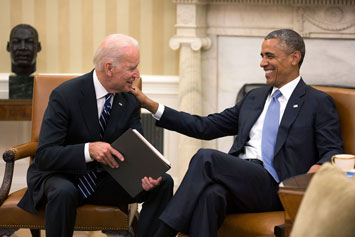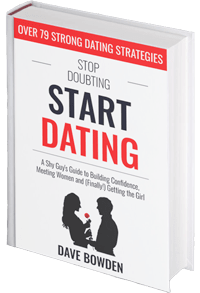 Book Excerpt
Book Excerpt
This post is an excerpt from Stop Doubting, Start Dating: The Shy Guy’s Guide To Building Confidence, Meeting Women, and (Finally!) Getting the Girl.
One of the things that can make dating such an intimidating proposition for a lot of guys is that each step along the way presents its own unique set of challenges.
First you have to learn how to talk to a woman confidently enough to ask her out, and whether online or in person, that’s no small task for guys who find themselves on the shyer or more introverted end of the spectrum.
Then, once you’re lucky enough to secure the date, a whole new set of nerves kicks in as you start to worry about how to show her a great time:
Where will you go? What will you talk about? Should you kiss her at the end? If so, how will you know if you’ve got the green light to make the first move? (Read on for much more on this.)
Just thinking about it is almost enough to make your palms sweat, to say nothing of your pits. (No? Just me? Well then, that was an embarrassing over-share…)
I know all too well how nerve-racking first dates can be, but the good news is that I also know that with the right tips, tricks and strategies, even the most nervous guys can learn how to become a great first date.
So whether you’re looking for a lifelong romantic relationship or a quick fling, in this post I’ll break down some of the best first date advice for guys who want their first date to be fun, flirty and impossible to forget (in a good way).
The 9 Best First Date Tips for Men
Breaking Down the Best First Date Advice for Guys Who Want to Make a Strong First Impression
1. She’s Nervous Too

When I was younger, I would get really nervous before a first date, and start obsessing over how to make a good impression:
“What am I going to wear? What am I going to say? How am I going to act?”
The one thing I didn’t think much about? My date.
And more specifically, what she might be thinking and feeling as she prepares for a first date.
Guys who feel nervous or even intimidated talking to women can often make the mistake of assuming that they’re the only ones who feel this way.
If we think about other people’s thoughts and feelings at all, it’s usually only briefly, because we assume that they’re much more comfortable with social interaction and we’re the ones who are at some kind of social deficit.
But the truth is that’s just our negativity bias getting the best of us.
According to Psych Central, a lot of people – maybe even 50% – consider themselves shy, meaning there’s a good chance that you’re not the only one feeling nervous about your date.
Recognizing that your date is a real person who probably feels a lot of the same trepidation as you is one of the most important things you can do to calm your nerves.
It makes you feel less like an outlier and more comfortable with the idea of meeting up with her—after all, at least you know you’ll have at least one thing in common.
Plus, shifting your focus to her nerves is a great way to keep you from obsessing about yours.
Obsessing over the things that make us nervous tends to accentuate and highlight them in our minds, which only leads to more over-thinking.
Focusing on something else – anything else – relieves us of this pressure.
First Date Tip #1:
Take a deep breath and imagine that your date is really nervous—at least twice as nervous as you are.
Instead of obsessing over what you’ll do to look and sound cool, think about ways you can make her feel comfortable instead, which will shift your focus away from your own nerves.
And even if she’s not quite as nervous as you imagine, at the end of the day she’ll appreciate you’re making an effort to make sure she’s comfortable.
Stop Doubting, Start Dating
The Shy Guy’s Guide To Building Confidence, Meeting Women, and (Finally!) Getting the Girl
Build More Confidence. Meet More Women. Get More Dates.
2. Compliments Show Confidence

On the surface, this doesn’t make any sense:
I know people like hearing nice things, and I want people to know when I admire something about them.
But for years I found it difficult to actually spit out positive sentiments when I felt them.
Maybe my discomfort owed to my (woefully misbegotten) notion that I should play it cool at all times and not reveal what I was thinking or feeling to people.
Or maybe it was just my general shyness kicking in, which often made it difficult to talk to people about anything.
I’m not sure where this strange fear came from, but when I read the book How to Win Friends & Influence People in my early 20s, I became very aware of just how much it had held me back.
In a section about becoming a friendlier person, author Dale Carnegie implores the reader to “give honest, sincere appreciation,” explaining:
“Nothing else so inspires and heartens people as words of appreciation. You and I may soon forget the words of encouragement and appreciation that we utter now, but the person to whom we have spoken them may treasure them and repeat them to themselves over a lifetime.”
A little heavy handed? Sure, just a touch. But is it accurate? Like Clint Barton at a shooting range.
Leaders Build People Up

Generally speaking, the people who compliment others most often are those who have the most power (whether real or perceived).
This makes sense too, since, as mentioned above, people who are shy, nervous or insecure generally tend to think more about themselves and their insecurities than other people.
But people who are comfortable and self-confident devote less mental energy to themselves and more to others, allowing them to not only notice others’ strengths, but also make sure people know they’ve been noticed.
No wonder Carnegie implores us to be “hearty in your approbation and lavish in your praise.”
A Quick Caveat
Before we move on, I just want to note the importance of two of Carnegie’s words: honest and sincere.
Paying people false praise will have the opposite effect of what you’re intending: it will make people suspicious of you, and with good reason.
Most people have pretty well honed bullshit-detectors, and they can tell when someone’s just trying to butter them up.
If they suspect that’s what you’re up to, they’re going to think you’re smarmy, not charming, and the whole endeavour will be for nought.
So make sure to keep your praise honest and sincere. But when praise is warranted, don’t hold back in expressing it.
Oh, And One More Thing…

Sincere compliments are great and can go a long way to making people feel comfortable around you, but be wary of too many compliments about her physical appearance.
Offering a sincere, “Wow, you look great” when the date starts is appropriate, and just good manners.
But beyond that, don’t overwhelm her with compliments about her body or her look. You don’t want her to feel objectified, or think that you’re only dating her because of her physical appearance. (You’re not, right?)
Instead, look for opportunities to praise her for who she is and what she does, not how she looks.
When she tells you about what field she studies or works in, you can point out its challenges and say, “You must be really…” then fill in the blank with whatever traits are necessary for her field: smart, hard-working, patient, organized, etc.
Look for ways to compliment her on things other than her looks and she’ll recognize you as a man whose appreciation runs more than skin deep.
First Date Tip #2:
Compliment your date honestly and sincerely.
Not only is this a great way to make a person feel good (which, as noted in Tip #1, should be one of your goals), it’s an easy way to convey your confidence and bolster her perception of you.
3. Don’t Defer the Date Planning

This is a mistake a lot of guys make when they first start gaining traction on a dating app, and it’s an understandable one.
After all, you want your date to think you’re nice, agreeable and kind, and there’s nothing wrong with that.
The mistake is in going too far to demonstrate those traits, which often results in guys bending over backwards to avoid making any date-related decision unless they’ve solicited her full and robust feedback.
This manifests itself most often before the date has even begun. Once the date is agreed upon, someone has to pick a time, place and activity.
It’s tempting to think that you should consult closely with her on this in order to choose the exact right place or activity that she’s going to enjoy.
But remember, you don’t know much about her yet, and teasing this information out before you’ve even gone on a first date is often more annoying than accommodating.
An (Agonizing) Example

If you’re too focused on being accommodating, the first conversation you have about your date might go something like this:
Her: Sure, I’d love to go out with you.
You: Great, where do you want to go?
Her: Ummm, well I don’t know really, I’m up for anything.
You: Well, do you have any favorite places?
Her: I mean, I’m not sure, there are a lot of places I like…
You: OK, what are your top three?
Pause here and ask yourself: how did that read to you?
Did it give you the impression that you were doing her a favor by being super accommodating, or did it feel more like you were shifting the burden of date planning over to her — and maybe even giving her the third degree about her interests?
A More Attractive Alternative

Her: Sure, I’d love to go out with you.
You: Great, I was thinking we could grab a drink at the pub on Main Street, do you know it?
Her: Oh, I don’t really like that pub actually, I’ve had really bad service there in the past.
You: Oh no problem, how about the wine bar on 4th street?
Her: OK sure, that sounds good.
In this example, you still come off as being accommodating – you’re not going to insist on going to a bar she doesn’t like – but you’ve also clearly put some thought into the date ahead of time and came to the table armed with some ideas.
Taking the reins and doing this kind of advanced planning has a number of advantages.
It suggests that you’re a go-getter who knows what he wants, that you’re not a hermit (because you’re familiar with the bar/social scene in your city), and most importantly, that you’re willing to take responsibility, rather than making her do it.
First Date Tip #3:
Don’t saddle your date with the responsibility of planning the actual date.
Whether you’re leaning more towards a quick coffee date, a short lunch date or a (hopefully extended) dinner date at a nice restaurant, have a few options in mind, and suggest your first choice.
If she’s up for it, then you’re all set for a great date. If not, be flexible and offer a back up, suggest a second location, and adjust the plan as needed.
To give you a bit of inspiration, Women’s Health has put together a list of first date ideas that you can spark ideas for a fun activity.
4. First Date Conversation Comes Naturally
(No, really!)

(Though there was certainly a time when that fear was basically crippling).
Instead, what scared me most was trying to figure out what the hell we would talk about if she actually said yes.
I used to be insecure about my conversation skills and terrified of awkward silences, and consequently terrible at making small talk with new people.
So the prospect of talking directly to a beautiful woman for hours on end, in real life no less, was among the most intimidating propositions I could imagine.
But looking back on it now with the benefit of hindsight, I realize just how misplaced (and utterly unnecessary) that fear actually was.
When two adults want to talk to each other, they’ll find something to talk about.
Especially if they happen to be in a situation where they a) find each other attractive, and b) have enough common interests that they agreed to go out with each other in the first place.
First Date Tip #4:
Don’t fret too much about what you’ll talk about on your date.
Even if you dont’ think of yourself as a good conversationalist, first date conversation tends to come more naturally than you might think.
5. Ask Open-Ended Questions

If you don’t think that an animated eight-year-old has anything to teach you about dating, then you, my friend, have not seen enough classic episodes of The Simpsons.
Way back in a 1993 episode called “I Love Lisa” (sidebar: holy shit this tv show is old), Ralph Wiggum pursues Lisa Simpson after Lisa gives him a Valentine’s Day card out of kindness.
Ralph finally gets what he wants when Lisa agrees to go out with him, but he’s not the most charismatic guy.
So when the date begins, Ralph finds himself tongue tied — and makes a classic conversational mistake, asking:
“So, do you like… stuff?”
In addition to being hilariously asinine, Ralph’s question suffers from a key structural flaw: it’s a closed-ended question.
By asking questions that begin with “Do you like…” you’re only leaving your date (or any other conversation partner, for that matter) two ways to answer: yes or no.

The problem is that it’s hard to answer yes-or-no questions in a way that moves the conversation forward, even when your subject is a little more interesting than “stuff.”
For instance, let’s say you want to talk about movies.
Movies can make a great small talk/first date topic because they’re so ubiquitous; everyone watches them sometimes, and different people have varying opinions about the best genres, films, actors, directors, etc.
But if you start the movie conversation with a straight yes-or-no question, you can stop it before it even gets rolling (and yes, that was a film pun).
You: So, do you like movies?
Her: Umm, no, I don’t watch a lot of movies.
You: Oh, uhhh, why not?
Her: I don’t know, I’m just not that into them.
Now you’re left two options, neither of them great:
You can either try to force the movie conversation when she’s already declared a lack of interest, or you can pivot away from the topic immediately, which might make for an awkward transition.

By contrast, when you wade into the topic with an open-ended question, the conversation can flow more naturally, whether she likes movies or not.
You: How do you feel about movies?
Her: Actually, I’m not a big fan.
You: Really? That’s interesting, why do you think that is?
Her: I’m not sure exactly. I was always a bookworm as a kid, so I think I just prefer…
By asking how she feels about the topic instead of “do you like…” you give her a chance to express something about herself, rather than just provide a minor detail about her preferences.
This opens the door for all sorts of follow-up questions based on what she says, which is what really gets the conversation going.
First Date Tip #5:
Remember that one of the easiest ways to get conversation flowing smoothly is to ask open-ended questions.
Before your first date, it’s a good idea to think about a few interesting topics you want to raise, and give some thought to how you can ask about them the right way, with an open-ended framing.
In general, asking about what she thinks or feels (e.g. “What’s your take on…?” or “How do you feel about…?”) is more effective for first date questions, rather than the kind that start with “Do you…?”
Pro Tip:
And if you really want to supercharge the effectiveness of this technique, make sure to practice active listening to show her that you’re not just a nice guy, but an attentive one too.
6. Do Your Homework

One of the reasons talking to a stranger is so intimidating is because you really don’t know anything about them, and therefore don’t know what to talk about to get the ball rolling.
But if someone has agreed to go out on a date with you, she’s not really a stranger.
Sure, you may only know a little bit about her, but I bet you know where to look in order to find out more.
If you met her using an online dating app like Tinder, Hinge, eharmony or Match.com, go back and re-read her online profile before your date.
What does she list as her interests? Does she make any jokes or offhand remarks you could ask her about or follow up on? What about her family, does she mention how many siblings she has or where she grew up?
If you met her through mutual friends, you can ask these kinds of questions of them to get the inside scoop (and since women tend to talk about this kind of stuff more than men, you can bet she’s probably doing the same).
Putting in this kind of legwork has two advantages.
First, it’ll arm you with even more conversational ammunition and help ensure you have plenty of good first date topics to cover when the conversation inevitably hits a lull.
But even more importantly, it’ll show her that you’re really interested in her—her life, her hobbies and her thoughts/opinions.
Cite Your Sources

One word of advice when referencing things from her life:
When you bring it up in conversation, the best thing to do is mention where you got the personal information.
If you want to follow up on something she wrote on her profile, say “Your profile said you’ve been skydiving before, what was that experience like?”
If you reached out to her best friend for some insight, say “Amanda mentioned that you like horseback riding, how did you get into that?”
The sad truth is that in the fully digital modern world we live in, everyone is at risk of being cyber-stalked, so there’s a fine line between interested and invasive.
And while you and I may not worry much about this, women are both much more at risk, and (quite rightly) much more sensitive to online creepiness.
Referencing your source shows that you’re interested enough to pay attention and take interest in her, but above-board (and sane) enough to keep your research well within the public domain.
First Date Tip #6:
Find out a few more specific things about her so that you can ask questions that go beyond the same rote “getting to know you” questions she’s been asked before.
But remember that if you’re going to get a little more personal, you want to cite your sources so she knows that you’re interested, not some weirdo who stalked her on social media.
7. It’s Not Just About Getting to Know Each Other

On first dates, fun trumps facts.
I really wish I had learned that one a decade ago.
Back then, I tended to use the same template for every first date: pick a quiet bar, or quiet coffee shop, or quiet place where we can take a nice long walk, and talk (and talk and talk) in order to get to know each other.
Then I’d pop a few breath mints, make the right level of eye contact, and ask all manner of biographical questions ad nauseum, only to find myself shocked when she would fail to respond to my texts the next day.
Doing your homework and having a few good questions in your quiver is a simple way to show your date that you’ve taken an interest in her.
But that doesn’t mean the right move is to treat your first date like a job interview, and grill her on every aspect of her life story.
Don’t Forget the Fun
Generally speaking, it’s true that people love to talk about themselves, which is why I think that doing a little homework is great advice.
But they also like to have a good time—and they inevitably like people who can show them a good time.
“The most important thing on any date, but especially a first date, is to have a fun first date,” Rick writes over on his Date School blog. “You need to have FUN with someone so you can truly see if you feel attracted to each other.”

You can sit down and share a meal or a few drinks with someone and learn all sorts of interesting things about them:
Where they grew up, how many siblings they have, what they studied in school, etc.
But attraction, romance and – dare I say it – even love are about so much more than that.
Even before she became my life partner, some of the most cherished memories my now-wife and I shared were from trips we took or activities we did:
The time we saw the Redwood trees in San Francisco. The epic bike ride we took in France. Helping her work up the courage to go down the waterslide at our hotel (then watching her go again, and again).
These are the moments that really brought us together.
Give some thought to things you can do in your city that will allow you to share some good vibes, and create a memory – and maybe even a bond – she won’t soon forget.
First Date Tip #7:
If you want to build a real connection, rather than just get to know each other, ask yourself: what are some things that tourists would do in your city?
Things that involve getting up and moving a bit, like bowling, axe throwing, or grabbing ice cream and going for a walk in the park, usually make for good dates, instead of just sitting in a movie theater or coffee shop.
8. Authenticity Beats Bravado

There’s probably no scenario where you want to put your best face forward more than on a first date.
After all, first impressions are powerful, and the old cliché about them happens to be true: you only get one chance.
But the mistake some guys make (and “some guys” is definitely a group that includes me) when they first start dating is to lay it on a little too thick.
In an effort to come off as cool, interesting, intriguing or worthy, it’s tempting to spend the entire time looking for ways to play up your best qualities.
This can manifest itself in a number of ways.
Maybe you try to shoehorn the fact that you were valedictorian into the conversation to let her know you’re smart, or make a big deal out of picking a fancy venue to imply that you have money.
Either way, if you try to play up an attribute in a way that doesn’t feel authentic and organic to the situation, it’s going to have the opposite of your desired effect:
Instead of seeming cool and competent, you’re more likely to come off as shallow, petty or insecure – all of which are a little off-putting, and raise red flags in your date’s mind.

The same thing goes for exaggerating – or outright lying – to make yourself seem cooler.
People can see through phoniness pretty easily, and women, in particular, tend to have pretty good bullshit detectors.
Even if you somehow (briefly) get away with it, there will eventually be a cost:
She may not know for sure by your next date, but at some point she’ll surmise that you are not, in fact, a Nobel Prize-winning philanthropist/neurosurgeon, but you are a liar.
Instead of fudging the truth or bending over backwards to try and show your strengths, try to play to them naturally by choosing the right venue.
If you’re a student of stand-up, take her to a comedy club. If you’re a pool shark, take her to a pool hall. If you’re a clothes horse, take her somewhere with a fancy dress code. If you’re a bowling fanatic, make better life choices take her to a bowling alley.
Just remember not to be too competitive if you’re doing an activity where you’re experienced and she’s not.
The last thing you want is to do is come off as petty and immature, so make sure not to take things too far, especially if she’s a novice at whatever activity you’re doing.
And if for whatever reason you find yourself in a situation that you’re not naturally inclined towards, admitting and acknowledging your flaws is never a bad thing, and beats the hell out of trying to hide them.
In fact, owning up to your weaknesses is a sign of strength, and an attractive mark of self-confidence.
First Date Tip #8:
Authenticity is attractive. To increase the odds of a successful first date, the best places or activities are the ones that naturally play to your strengths.
But if your flaws do reveal themselves, don’t be afraid to acknowledge and take ownership of them.
9. Skip the Kiss

But allow me to make the case for skipping the first date kiss altogether.
Just as you want to make a strong first impression, you also want to have a smart exit strategy, so you can end on a high note.
I recognize that for a lot of guys, that means finishing the date with a kiss – or more – and I can definitely understand the desire to get physical fast.
But foregoing the kiss on the first date has a number of advantages.
A) It Spares You Some Nerves
First and foremost, it alleviates you of a lot of anxiety. First dates can be nerve-wracking, and no moment more so than the end.
As you attempt to keep up the conversation and maintain your composure, your mind races and your heart rate skyrockets as you frantically try to read her body language and figure out where, when and how to lean in and go for the kiss.
But deciding from the outset that you’re going to skip the kiss and go for a hug at the end of the date completely frees you of all that stress.
Instead of seeming nervous, fidgety and awkward as you desperately try to read the signs and strategize, you’ll be calm, cool and collected because you already know how the date will end—on your terms.
B) It Avoids Awkwardness

Sometimes after a first date, it can be hard to tell if you should kiss each other or not.
You start doing a kind of romantic calculus in your head like, “OK, she seemed to have a good time. I think she likes me. She might be giving me the sign. Wait, was that a sign? Or was she just scratching her ear? This is confusing.”
In the best case scenario, she’s thinking something similar and also doesn’t know how to initiate. In the worst case, she doesn’t want you to touch her and any attempt to put your lips on her will be wholly unwelcome.
Knowing from the start that you’re not going to kiss means that you’re also not going to bother doing that awkward dance.
If all goes well, then she’ll likely want to see you again. And after a second date – and twice as much time spent getting to know each other – it’ll be much easier to infer that you like each other, and a lot less awkward when you kiss for the first time.
C) You (Might) Leave Her Wanting More

I started this post by imploring you to think about her wants and needs, and if you guys hit it off and everything went well, she may be expecting you to pucker up before you part ways.
But holding back can actually pay dividends down the road. People naturally tend to want what they can’t have, which is why “playing hard to get” has been a dating strategy for about as long as dating’s been a thing.
If she wants to kiss you at the end of the first date, well, that’s a pretty good sign that she’ll also want a second date.
But by showing a little restraint and skipping the kiss the first time around, you’ll inject a little mystery into the equation, which will make her more curious—and eve more excited to see you again to solve the mystery.
First Date Tip #9:
Skip the kiss. It’ll let you feel more calm and confident throughout the date, and spare you both some awkwardness at the end.
Plus, she might even find herself hoping that you’ll text to set up date number two, so you can have your first kiss the next time you meet.
Closing Thoughts
First dates aren’t rocket science, but they can be tricky, especially if you’re new to the dating game, or not fully confident in your communication skills.
One of the reasons first dates used to feel so intimidating to me is because I didn’t have much dating experience—and I definitely didn’t know any of the stuff I shared above.
But with a little effort – and, I hope, a little practice – you can learn from my experience and skip to the part where dating becomes a lot more fun than it is fearful.
The best way to learn from my experience is to pick up my book, Stop Doubting, Start Dating, where I share the full story of how I (finally!) figured out how to push past my fears, and show you exactly how to replicate my romantic success.
While I (of course) think picking up the book is a great idea, either way just remember that doing the little things right can add up to big results, which is why I pay so much attention to the details that most guys overlook.
There are a lot of good girls out there who deserve to have a fun, flirty and proper first date, and when you stack all the small things listed on top of each other, your odds of having a great date increase exponentially.
Good luck!
Get the Book Today!
Stop Doubting, Start Dating
Build More Confidence. Meet More Women. Get More Dates.
FAQ
Should you kiss on a first date?
As mentioned above, no, I don’t think you should kiss on a first date. Deciding beforehand that you’re not going to kiss alleviates the stress of worrying about what to do at the end of the date, which makes you feel more confident throughout.
What would you not do on a first date?
The number one thing not to do on a first date is misrepresent yourself, or lead your date to believe you’re something – or someone – that you’re not.
Painting yourself in a flattering light is the most natural thing to do, because everyone wants to put their best face forward on a first date.
But there’s a difference between being generous in the way you talk about yourself and being deceptive, and you have to be careful not to veer into the realm of the untrue.
If your date is a good match and you make a strong connection, then this could be someone you end up spending time with in the future – possibly a whole lotta time, if it goes really well – and in the long run the truth is likely to come out.
At this early stage it’s better to be honest than to put on some kind of charade, which is both misleading and impossible to maintain.
What are red flags on a first date?
Your definition of what constitutes a red flag might differ from mine or someone else’s, but there are a few things to look out for on a first date that might indicate this isn’t a good match.
First, if your date doesn’t abide by my advice above, and says something that you know to be untrue, it’s definitely a red flag.
Whether you’re looking for the right person to marry or just an instant connection, honesty is key, and if you’ve already caught her in a lie, it will be hard to believe her moving forward.
The second thing is how she treats people other than you. Does she flirt shamelessly with the waiter? Does she chastise the cashier for giving you the wrong change? Does she gossip or talk shit about someone you encountered once they’re gone?
Keep an eye and ear out for how she treats people, because it probably says a lot about both her character, and how she’ll treat you in the future.
Third, if you’re looking for a long-term match, keep an ear out for any hints of ideology that you just fundamentally disagree with.
If she’s a staunch adherent of a religion that you’re not a member of, or has deeply held believes that are dramatically opposed to yours, it’s probably better to agree to disagree and end things early, rather than move forward knowing that there are some pretty big divides in your worldview.
The good news is that, while you may not want a girlfriend or romantic partner whose views oppose your own, sometimes having a new friend with a different worldview can be enlightening. And ending things early will at least keep the possibility of a platonic friendship open.
How can I be attractive on a first date?
The best way to be attractive on a first date is to be comfortable and confident in your own skin. If you’re trying to represent yourself as a hard-ass when you’re really a softy, you’re going to be uncomfortable, and that inauthenticity will show through.
But if you approach the date in a spirit of transparency, with an honest desire to show her who you really are, you’ll likely feel a lot more comfortable, and that kind of self-contentment is very attractive.
Further Reading ↓
Men’s Dating Advice From Irreverent Gent:




I think this is one of the most useful and practical articles on dating that I’ve come across. Thanks for the insight!
My pleasure Will, thanks for the kinds words. Very glad to hear you got something out of the post.